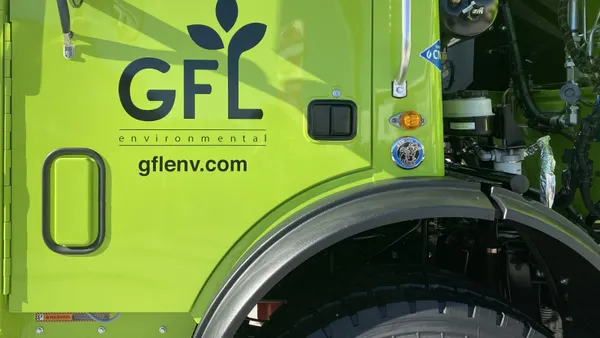Dive Brief:
- Waste Pro recently reported spending a record $140 million on 15 acquisitions in 2024. CEO Sean Jennings said in an interview the company’s pipeline of potential deals is on track to exceed that amount for 2025.
- The transactions were worth an estimated $62 million in annualized revenue. They included four landfills, various transfer stations and multiple hauling operations in Alabama, Florida, Georgia, Kentucky, Louisiana, Mississippi, North Carolina and Tennessee.
- Waste Pro also reported signing 32 new municipal contracts, as well as 32 renewals, worth an estimated $906 million over their initial lifespan. Major contracts included Sarasota and Orange counties in Florida.
Dive Insight:
Florida-based Waste Pro, founded in 2001, has steadily grown in the Southeast to become one of the industry’s largest private companies.
It previously targeted $1.3 billion in revenue for 2024 and aims to hit $2 billion in the coming years. While the company’s 2024 books aren’t fully closed yet, Jennings said he expects Waste Pro to land around its 2024 revenue target.
M&A isn’t new for the company, but Waste Pro also hasn’t been known as one of the industry’s more active acquirers in recent years.
The company’s 2024 purchases included Workbox; Gulf Pride Waste Solutions; Republic Services’ operations in Cumming, Georgia; Florence Recycling; McMinn Waste Removal; Cash Sanitation; Chase N Green Transfer Station; Geaux Waste; SPI Waste & Recycling; Killona Ventures Landfill; Total Waste Solutions; Sunshine Grove Landfill; 98 Waste and Goodwin Sanitation.
Jennings said many of these opportunities had been in the works for an average of three to five years and fit with the company’s growth strategy.
“All of these were either pure landfill, post-collection or open market-based businesses,” he said. “We're trying to increase the share of our revenue base that is based on either post-collection or true open market, commercial, permanent work.”
According to a Fitch credit rating report, an estimated 40% of Waste Pro’s 2023 revenue came from open market business. Overall, 73% of the company’s business that year came from residential and commercial collection.
While the deals are notable for their geographic expansion — for example, making Waste Pro “the dominant solid waste and recycling company” in Louisiana and expanding its residential service to Kentucky — Jennings said the main focus was finding companies with complementary cultures.
“We looked at the owners that were associated with the business and saw that we could have a long-term continued partnership with them being a part of Waste Pro and us basically joining resources ... and the relationships that they have in their markets.”
The Southeast remains an active region for acquisitions and contract opportunities due to its population growth. The area includes the industry’s largest publicly traded companies, multiple private equity and infrastructure fund-backed entrants and some internationally-backed players. M&A highlights in Florida last year included purchases by GFL Environmental and Coastal Waste & Recycling, among others.
Waste Pro, which grew with an emphasis on municipal contracts, has been especially focused on pricing in recent years due to effects from the pandemic and inflation. The company has chosen not to pursue certain contract opportunities — or not continue with existing ones such as Buncombe County, North Carolina — as a result.
Jennings attributed the company’s large amount of 2024 contract wins and renewals in part to the timing of local government procurement cycles. The deals cover an estimated 460,000 residential customers, including nearly 200,000 new ones.
He said most competitors in the Southeast have taken a similar approach to pricing in recent years.
“There's no magic. We all use the same equipment. We all are trying to hire similar technicians and drivers. So our costs really are all the same.”
Overall, Waste Pro reports servicing an estimated 2.5 million customers across all lines of business in 11 states. The company employs over 5,000 people and operates a fleet of approximately 4,200 vehicles.











